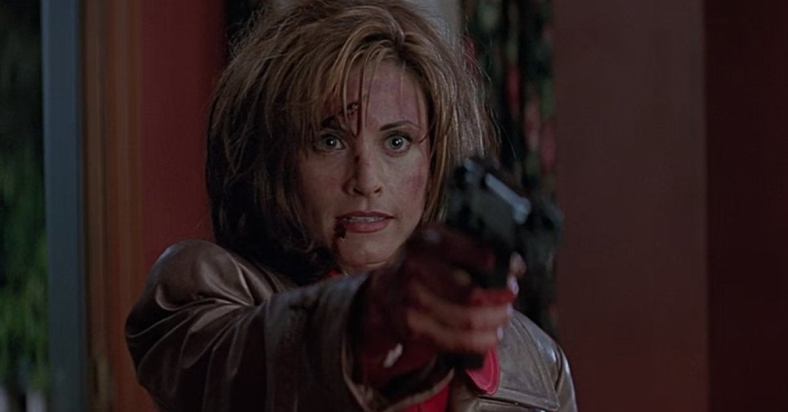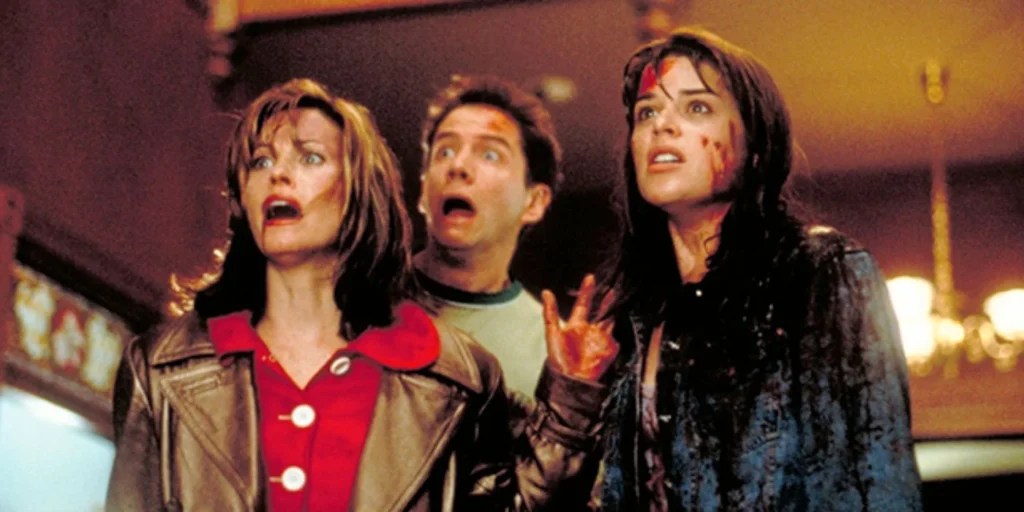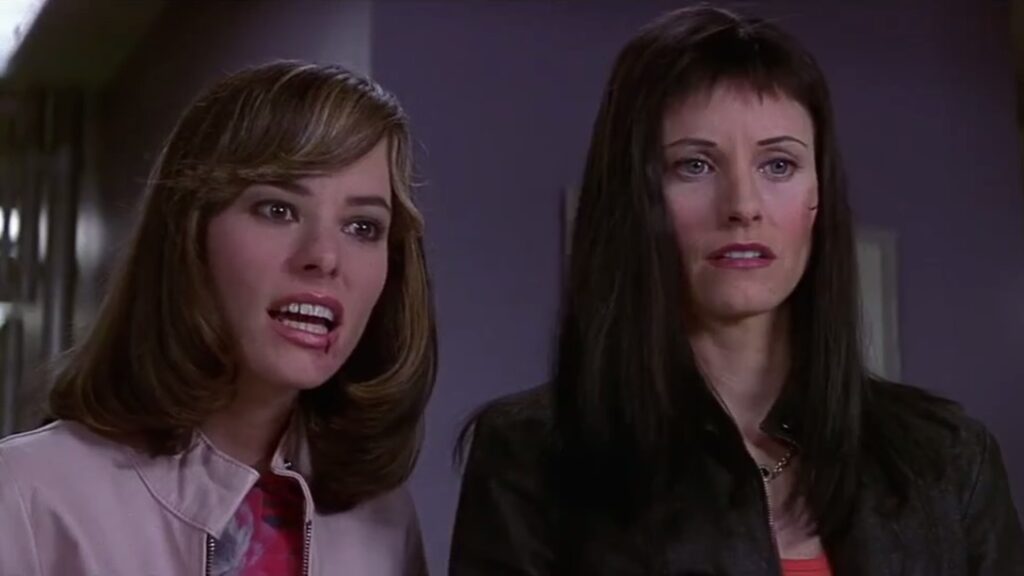Gale Weathers and the Vilification of Female Ambition

With the release of Scream (2022), Sidney Prescott (Neve Campbell) cements her status as an iconic final girl. Appearing in and surviving all five franchise films to date, she rivals perhaps only Halloween’s Laurie Strode (Jaime Lee Curtis) as queen of the archetype. But unlike most final girls, Sidney is not her franchise’s sole survivor. Standing next to her in every film is the often forgotten Gale Weathers (Courteney Cox).
Arguably a final girl in her own right, the journalist is every bit as important to the franchise as its star. But Gale never seems to get the recognition bestowed upon her fellow survivor, Sidney. In fact, she is often the punching bag of the series. She’s constantly vilified for her ambition and tendency to value her story above the feelings of others. Though she does lose her cynicism and myopic drive throughout the series, she is constantly punished for seeking fame and recognition. It’s a burden male characters of the genre rarely have to carry.
SCREAM
When we first meet Gale, she is investigating the murders of high school students Casey Becker (Drew Barrymore) and Steven Orth (Kevin Patrick Walls). But this is not her first visit to Woodsboro. A year earlier, she covered the death of Sidney’s mother. Theorizing that Sidney has falsely identified Cotton Weary (Liev Schreiber) as the killer, she’s published many stories all but accusing the teenager of lying. Though she is perhaps callous in her approach, it’s worth mentioning that she is right about his innocence. Whatever her intentions, her dedication to the story does save his life. But her unbridled ambition causes her to come across as a hindrance to the investigation if not a secondary villain.
Gale is anxious to prove herself in a male-dominated field and ruthless in her pursuit of a lead. Early characterizations of the Top Story reporter are not flattering. She’s extremely rude to her cameraman and relishes the idea of saving Cotton because it will increase her book sales. But meeting Deputy Dewey Riley (David Arquette) seems to bring out her softer side. They share immediate chemistry and bond over a shared feeling that they’re not taken seriously. The two go on a quasi-date, investigating the party that winds up becoming the film’s final killing spree. Though it could be argued that initially Gale uses Dewey to get access to his insider information, her attraction seems genuine. It’s the beginning of one of horror’s great love stories, both on and off the screen.
Related: The Spirit of Stu Still Lives On Inside the ‘Scream’ House [Horror Reel Estate]
Though Sidney is constantly credited with defeating the primary killer Billy Loomis (Skeet Ulrich), Gale is the one who actually fires the decisive shot and a pivotal force in the film’s conclusion. Part of what sets her apart from perpetual victim/survivor Sidney is that Gale inserts herself into the story, appearing at crime scenes and hounding friends and family of the victims. But it’s this desire to be involved in the story that saves Sidney’s life. If she had not returned to the house after crashing the news van or returned to the house after being knocked out by Billy on the porch, Sidney would be dead and Billy would likely get away with the murders.
The original film concludes with Gale’s broadcast. Moments after Billy’s death, she jumps into action commanding the camera and giving an impromptu eyewitness account to a new camera team. She gets the final line of the film: “This is my big shot. Let’s go”. Her involvement in the case will catapult her to stardom, but subsequent films will ask her to apologize for how she got there.

SCREAM 2
The second film in the series sees Gale’s most importantly personal growth. Having previously written the book, The Woodsboro Murders, chronicling the events of the first film, she now travels to Windsor College to investigate the murder of two students. She once again inserts herself into the story. Gale is delighted that the murders happened during the premiere of the film adaptation of her book. Though she’s gained quite a bit of fame due to her coverage of the murders, she’s also hurt a lot of people. Her familiarity with Dewey suggests they’ve taken their relationship forward. But they’re now at odds due to the way she characterized him in her book. Sidney is quick to remind fellow survivor Randy Meeks (Jamie Kennedy) that she saved their lives. But again Gale is viewed as an antagonist for most of the film.
In conversations with fellow reporter Debbie Salt (Laurie Metcalf), she is again rude and reminds her new cameraman Joel (Duane Martin) to “check [his] conscience at the door.” Now free based on her reporting, Cotton Weary is also a larger factor in this film. Gale promises him screen time in an exclusive interview with Sidney. Unfortunately, she neglects to tell Sidney about her plans, surprising her with Cotton and a bunch of cameras on her college lawn. It’s a callous move designed only to further her own career and a low point for the beloved character. When Dewey confronts her about it, she says she was just doing her job. And she’s right.
Related: In Defense of ‘Scream 3’s’ Voice Changer
She is a part of a cut-throat industry. Though she uses this as an excuse to abandon her ethics, Gale is trying to work her way up in an industry known for overlooking women. Is she wrong for wanting this interview? In the last film, she was punished and even punched for her theory that Cotton was innocent. Having been proven right, is it so wrong to want to capitalize on her hunch?
Gale does redeem herself throughout the film. After Randy’s death, she volunteers her own footage to help find the killer and offers a heartfelt apology to Dewey. Though it’s notable that she does not apologize for writing the book, only for the way her actions hurt him. After the killers are dispatched, Joel hands her the microphone and asks her to start rolling. Believing Dewey to be dead and having just survived a massive trauma for a second time, she understandably hesitates.
When Dewey is wheeled into an ambulance, alive but injured, she rushes over to him, eschewing the cameras to stay with the person she loves. It’s the last time she’ll be shown with the choice to film immediately after the final murder spree. Though Scream 2 indirectly vilifies Gale for her career choices, her arc lies in learning when to put the camera down for the benefit of others without casting it aside for good.
SCREAM 3
The next film in the series, Scream 3, is not nearly so kind. Its script is seemingly determined to punish her for her ambition. When we rejoin her story, she’s giving a lecture to a group of journalists. She leaves them with this advice: “Don’t be afraid to let the world hate you”. Gale knows all too well how women who insist on their own way are viewed by a misogynistic world. In response to her statement, a man stands up and asks her if it was worth it.
The implication is that in search of her career, she’s abandoned the approved values for women: loving relationships and a family. Survivors like Sidney who are targeted through no action of their own are regarded as sympathetic heroes. Not to take anything away from the beloved final girl, but there are other aspects of femininity. Gale chooses the spotlight. And since that is traditionally viewed as a space dominated by men, she becomes a threat to the established patriarchal order.
Scream 3 even goes so far as to provide a satirical version of her character. Jennifer Jolie (Parker Posey) portrays her in the current Stab movie and is also in a relationship with Dewey. Though scenes between Gale and Jennifer are the strongest of the film, Posey’s character exists to not only mock Gale, but to provide Dewey with another way to insult her. Ostensibly helping Jennifer prepare for the role, he’s told his new girlfriend all about how cold and calculating Gale can be. But also that her callous exterior hides a lost and lonely little girl inside. Though this is probably meant to redeem Gale, it is arguably the most offensive depiction. Why does her ambition have to be a cover for anything? What is wrong with simply wanting to be the best in her field?
Related: ‘Scream (2022)’ Is Bloody, Funny, And One Hell Of A Good Time
The conclusion of the two lovers’ arc is meant to be sweet. But it leaves a sour taste in the mouth. In their final scene, Dewey gives Gale a copy of her own book, The Woodsboro Murders. She notes that he hates the book, something that must be painful given the fact that it’s essentially what her career is based on and that it tells the story of the first time she saved his life. When Gale opens the book, she sees that its heart has been cut out. In the jagged hole lies an engagement ring. She says yes and agrees to a life with him. But it’s based on an unspoken agreement that she will abandon the part of herself that makes her happy.

A relationship with Dewey comes at the cost of her career. While this is a valid choice made by many men and women, it’s implied that giving up her own dreams for love is the right choice to make and not a betrayal of her own happiness. In Scream 3, Gale gets her happy ending. But future films will show that it makes everyone happy but her.
SCREAM 4
Scream 4 follows the logical thread of Gale’s choice. Married to Dewey, now Woodsboro’s chief of police, she spends her days trying to write fiction but mostly staring at a blank page. In contrast, Sidney has also written a book about her experiences and visits Woodsboro on a nationwide publicity tour. The vilification here is stark. Sidney is praised for writing about her experiences, something Gale has been criticized for throughout the franchise. Time and again, Gale is reminded that it’s Sidney’s version of events that is valued, not hers. Gale is opportunistic and cruel for writing her books while Sidney is brave.
Another mirror to Gale is presented in Sidney’s publicist Rebecca Walters (Alison Brie), an ambitious woman who, like Gale, relishes the thought of more murders happening in conjunction with Sidney’s book release. In an awkward conversation, Rebecca notes that Gale gave everything up for love, something that comes across as sounding like an insult. While there’s nothing wrong with sacrificing a career for love, it’s implied that Gale is wrong for wanting a career in the first place. She’s coldhearted for the ambition that drives her. Now criticized for choosing Dewey, she finds that she can’t win. Though she loves Dewey, it’s clear that she does not love the life she has with him.
Related: ‘Scream’: Should Our Trio Make The Final Cut?
The way Dewey treats Gale in Scream 4 is beyond frustrating. When the killings begin again, she wants to help. Having been pivotal in solving all three of the previous murder sprees, she wants to use her investigative skills to help catch the killer. But over and over again, Dewey shuts her out. Going rogue in her investigation, she finds that it brings her back to metaphorical life. She helps to crack the case and is again pivotal in the murderer’s defeat. In Scream 4, Gale finally stops letting others make her feel guilty for her ambition. She is an investigative journalist. That’s who she is and there’s nothing wrong with it.
SCREAM 5
The franchise’s most recent chapter is a heart-wrenching journey for Gale, but arguably gives her the most compassionate closure. Now the host of a nationwide morning show, Gale has achieved the pinnacle of her career. But it’s cost her her marriage. In her last conversation with Dewey we learn that the couple moved to New York because it was her turn to further her career. Dewey admits that it did not make him happy and he left his marriage in the middle of the night. Now separated, he is able to see that though the two desperately love each other, they simply want different things. He finally accepts her ambition without heaping guilt and shame onto her for it.

Scream (2022) gives Gale nearly equal billing as Sidney. Taking a page from her old friend’s book, Sidney places a tracking device on new final girl Sam (Melissa Barrera)’s car, noting that the old Gale Weathers would do the same thing. For decades, Gale has been maligned for these types of duplicitous investigative techniques. Seeing Sidney unabashedly embrace Gale’s tricks is a touching moment in the two women’s evolving friendship. While following the car, Gale blames herself for 25 years of murder, wondering if any of them would have happened if she hadn’t written her first book about Maureen’s murder. Sidney is quick to correct her and Gale probably doesn’t believe this either. Lost in grief, she is likely expressing understandable guilt and regret for involving herself in the story and forming relationships that have caused her so much pain.
Related: ‘Scream 2’s Opening is the Best in the Series
In the aftermath of the film’s climax, the two old friends sit next to each other in an ambulance as Sam approaches to thank both of them for their part in saving her life. She asks Sidney how she’s feeling then turns to Gale and asks her the same question. It’s a stunning moment that highlights how rarely she’s been asked this throughout the franchise. For five films now, Gale has been demonized for the ambition that consistently leads to the identities of the killers. She’s been demeaned and dismissed while saving the lives of the people who’ve grown to feel like her family. The honesty in her answer, “Ask me in a few days,” is beautiful and reveals how much she’s grown throughout the films. She doesn’t put on a brave face because she’s let the need for that protective exterior go.
Earlier in the film, Dewey remembers that she was always happiest when she was writing. Now she muses about writing a book to honor him, her best friend. It’s a beautiful ending for a phenomenal woman who’s never been afraid to be herself even when it feels like the world is against her. She’s finally given equal standing and revered as the phenomenal final girl she really is. Gale Weathers is an inspiration to millions of women and a shining example of refusing to fear hate and vilification from a misogynistic world.
Categorized:Editorials News

